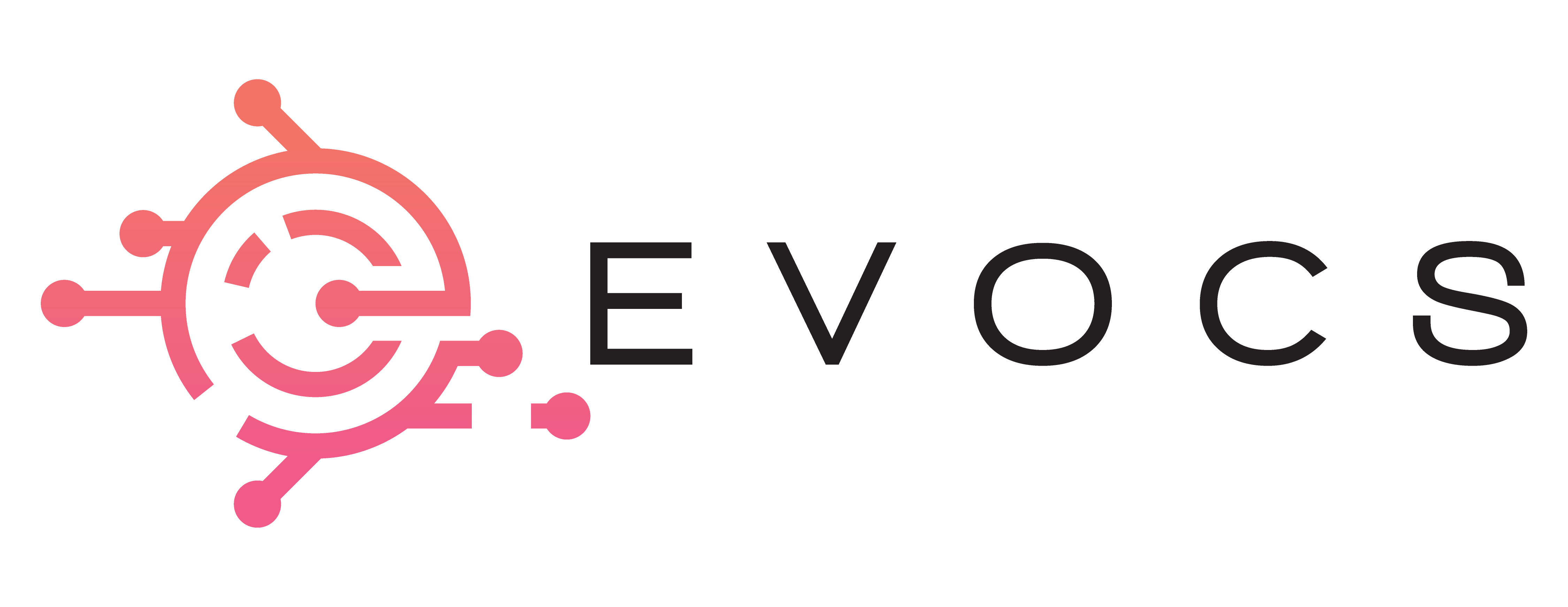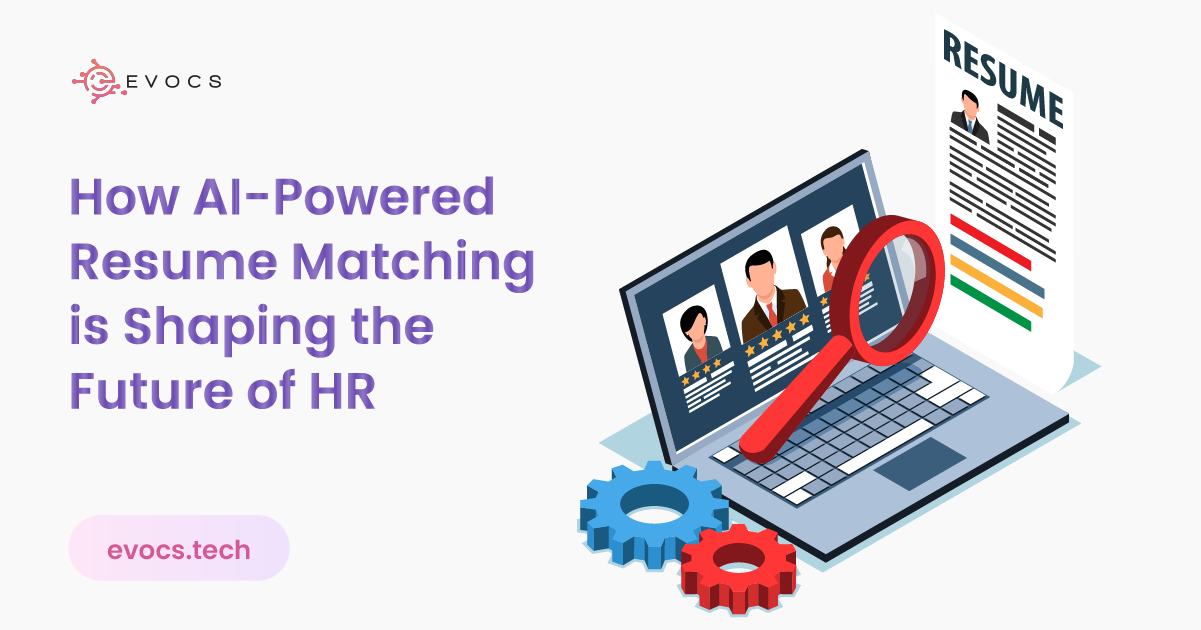
In today’s fast-paced job market, finding the perfect candidate can feel like searching for a needle in a haystack. Enter AI-powered resume matching, a surprise element for HR professionals. But what exactly is AI-powered resume matching, and why is it revolutionizing the recruitment process?

In this blog, we will delve into the ins and outs of AI-powered resume matching, exploring how it works, its benefits, and why it’s becoming an indispensable tool for HR professionals. This guide will provide valuable insights into the future of hiring, powered by AI.
The Ins and Outs of AI-Powered Resume Matching
Artificial intelligence (AI) is becoming an integral part of various industries, and HR is no exception. AI is being utilized to streamline tasks, enhance decision-making, and improve efficiency in recruitment and employee management. AI-powered resume matching is an advanced technology that maximizes artificial intelligence to streamline the recruitment process.
Imagine having a super-smart assistant who can read through thousands of resumes in minutes and pick out the perfect candidates for your job openings. That’s precisely what AI-powered resume matching does. It uses sophisticated algorithms to analyze and compare resumes with job descriptions, ensuring the best matches are identified quickly and efficiently.

Why Resume Matching is the Key to Hiring Success?
Effective resume matching is crucial for several reasons. First, it saves time and effort for HR professionals, allowing them to focus on more strategic tasks rather than sifting through countless resumes. Second, it improves the quality of hires by ensuring that candidates who best meet the job requirements are prioritized. Third, it enhances the candidate experience by providing quicker responses and more relevant job matches.
Resume matching is a critical component of the recruitment process. Finding the right candidate among hundreds of applications can be daunting and time-consuming. AI-powered resume matching helps recruiters quickly identify top candidates, ensuring a better fit for the role and the organization. This technology uses advanced algorithms to compare resumes against job descriptions, highlighting the most suitable candidates.
Uncovering the Magic: How AI-Powered Resume Matching Works
AI-powered resume matching uses advanced technology to streamline the hiring process. At its core, it makes the most of AI technology to read, understand, and evaluate resumes much faster than any human can. The system scans through hundreds or even thousands of resumes, picking out the most relevant information that matches the job description.

Key Algorithms and Processes
The magic behind AI-powered resume matching lies in its algorithms. Here are the key processes involved:
Data Collection:
The system gathers data from resumes and job descriptions. This includes details like skills, experience, education, and other relevant qualifications.
Parsing Resumes:
The AI breaks down resumes into readable data points, such as skills, experience, education, and more.
Natural Language Processing (NLP):
NLP technology allows the AI to understand and interpret the language used in resumes and job descriptions. It’s like having a translator that speaks both “resume” and “job requirement” fluently.
Algorithmic Matching:
Advanced algorithms compare the information from resumes to the job requirements. These algorithms consider various factors, such as keyword matches, skill relevance, and experience levels.
Keyword Matching:
It looks for keywords that match the job description. For example, if the job requires “project management” skills, the AI will prioritize resumes mentioning this.
Scoring and Ranking:
The AI assigns scores to each resume based on how well they match the job description. The highest-scoring resumes are ranked at the top, making it easier for recruiters to identify the best candidates.
Learning and Improving:
Over time, the AI learns from previous matches, continuously improving its accuracy and efficiency.
The Unmatched Benefits of AI-Powered Resume Matching
Efficiency:
Gone are the days of sifting through endless piles of resumes. AI can scan and evaluate thousands of resumes in a fraction of the time it takes a human recruiter. This speed not only saves time but also accelerates the hiring process.
Accuracy:
AI reduces human biases and errors in the resume screening process. By focusing purely on data and qualifications, AI ensures that the most qualified candidates are highlighted, regardless of their background.
Cost-Effectiveness:
By automating the initial screening process, companies can reduce recruitment costs. Less time spent on manual resume reviews means lower administrative expenses.
Improved Candidate Experience:
Faster response times and more accurate matching mean that candidates are more likely to find jobs that fit their skills and interests. This leads to higher job satisfaction and lower turnover rates.
Scalability:
Whether you’re hiring for one position or a hundred, AI-powered resume matching can handle the workload. It scales effortlessly to meet the needs of growing companies.
AI-powered resume matching is revolutionizing the recruitment process by bringing efficiency, accuracy, cost-effectiveness, and improved candidate experiences to the forefront. It’s the perfect blend of technology and HR expertise, making hiring smarter and more streamlined. So, next time you find yourself drowning in a sea of resumes, just remember: there’s an AI for that!
Enhancing Candidate Experience
One of the standout benefits of AI-powered resume matching is its ability to greatly enhance the candidate experience. Let’s dive into how AI achieves this:
Personalized Job Recommendations
AI algorithms analyze each candidate’s resume, comparing skills, experiences, and preferences with available job openings. This sophisticated matching process ensures that candidates receive job recommendations that truly align with their qualifications and career aspirations. Imagine receiving job suggestions that are a perfect fit for you—no more sifting through irrelevant job postings

Faster and More Responsive Communication
AI-powered systems can significantly speed up the recruitment process. From instant acknowledgment of application receipt to timely updates on application status, candidates no longer have to endure long periods of silence. This responsiveness not only keeps candidates informed but also boosts their confidence in the hiring process. Quick and clear communication makes candidates feel valued and respected, improving their overall experience.

By focusing on personalized job recommendations and faster, more responsive communication, AI is transforming the candidate experience. This technology ensures that candidates feel engaged and valued throughout the hiring process, ultimately leading to a more positive perception of the employer.
So, why not embrace AI-powered resume matching and make your recruitment process smoother, smarter, and more candidate-friendly? Because in the world of HR, happy candidates make for happy hires!
Common Myths About AI in Recruitment: Separating Fact from Fiction
Artificial Intelligence (AI) has revolutionized many fields, and recruitment is no exception. However, like any groundbreaking technology, it comes with its share of misconceptions. Let’s clear up some common myths about AI in recruitment:
Myth 1: AI Will Replace HR Professionals
Debunking:
AI is a tool designed to assist HR professionals, not replace them. It handles repetitive tasks, allowing HR to focus on strategic roles.
Real-World Example:
Companies use AI to scan resumes for keywords, saving HR countless hours. However, the final hiring decision is always human. Relax, robots aren’t here to steal your job…yet!
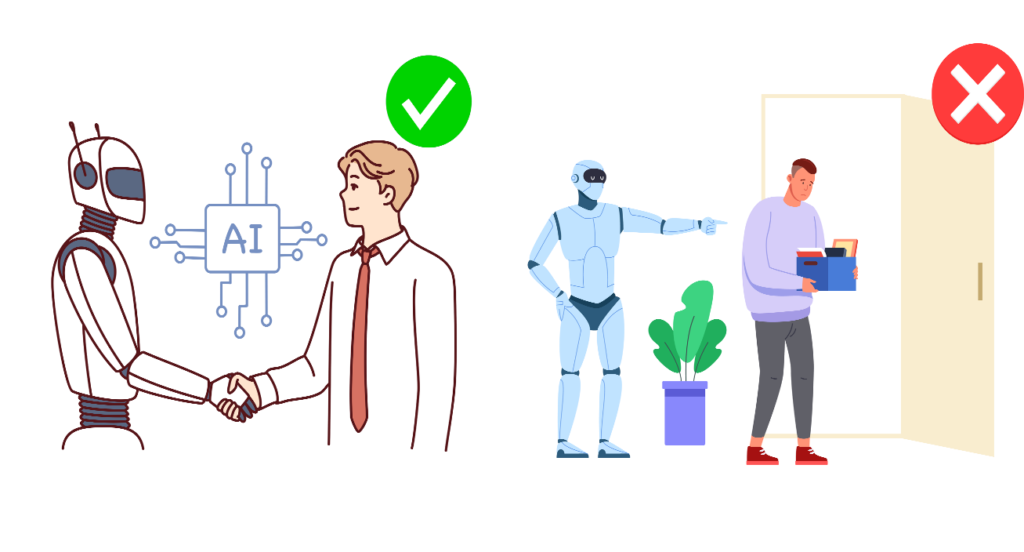
Myth 2: AI Can’t Understand Human Emotions
Debunking:
While AI doesn’t “feel” emotions, it can analyze language and tone to gauge sentiment. It helps identify candidates who fit the company culture.
Real-World Example:
AI tools analyze candidate responses for enthusiasm and cultural fit during video interviews.
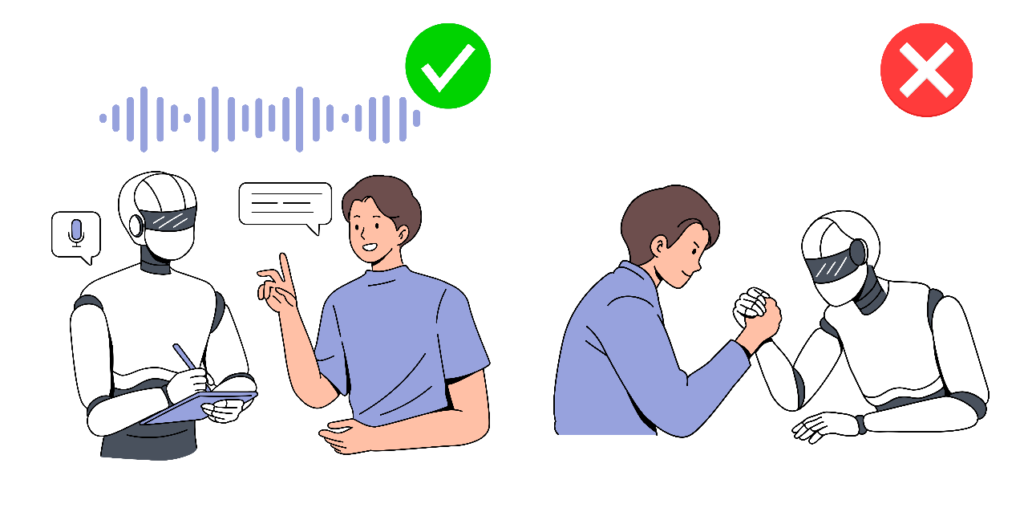
Myth 3: AI Introduces Bias into the Recruitment Process
Debunking:
AI is programmed to reduce human bias, not introduce it. Properly trained AI can make recruitment fairer by focusing on skills and experience.
Real-World Example:
AI systems are designed to ignore demographic information and focus on qualifications, leveling the playing field. AI judges you by your skills, not by how snazzy your LinkedIn photo is!”
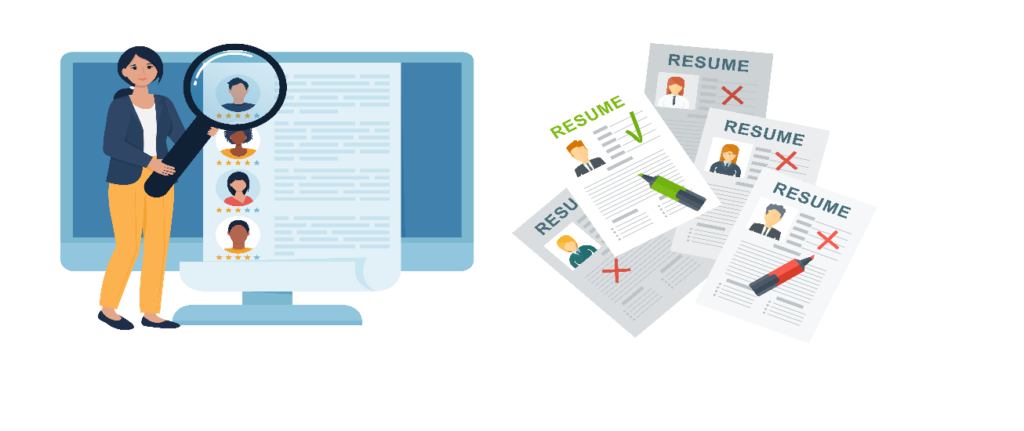
Myth 4: AI in Recruitment is Too Expensive for Small Businesses
Debunking:
AI tools are becoming more affordable and scalable, making them accessible to businesses of all sizes.
Real-World Example:
Many startups and small businesses use AI-powered recruitment tools to compete with larger firms.
Myth 5: AI in Recruitment is Unreliable
Debunking:
AI technology in recruitment is continually improving, becoming more accurate and reliable over time.
Real-World Example:
AI tools with machine learning capabilities improve with each hiring cycle, learning from past data to make better decisions.
Why Understanding These Myths Is Important?
Believing in these myths can hold businesses back from adopting innovative solutions that could significantly improve their hiring processes. Embracing AI in recruitment doesn’t mean surrendering to robots; it means enhancing the capabilities of HR professionals.
The future of HR is undeniably intertwined with AI. By disproving these myths, we can appreciate how AI complements human judgment, enhances efficiency, and ensures a fairer hiring process. So, let’s welcome our AI companions and remember: they’re here to help, not to take over
Challenges and Limitations: AI a Double-Edged Sword in Recruitment?
Addressing Potential Biases in Algorithms
One of the significant challenges of AI resume matching is the potential for bias in algorithms. Even though AI aims to be objective, it can sometimes inherit biases from the data it is trained on. For example, if the training data is biased toward certain demographics, the AI might favor candidates from those groups, unintentionally perpetuating discrimination. This can lead to unfair hiring practices and a lack of diversity in the workplace.
Discussing Data Privacy Concerns
Data privacy is another critical concern when using AI for resume matching. The process involves handling sensitive personal information, which needs to be protected from unauthorized access and breaches. Ensuring compliance with data protection regulations, such as GDPR, is essential. Employers must be transparent about how they collect, use, and store candidates’ data to build trust and avoid legal issues.
Using AI in resume matching is a powerful tool, but it comes with its set of limitations and challenges. By addressing these potential biases and data privacy concerns, organizations can harness the benefits of AI while maintaining fairness and compliance. It’s crucial to continually monitor and refine AI systems to ensure they serve as effective and ethical tools in the recruitment process.
Remember, even robots can have blind spots and data leaks, so keep an eye on those algorithms!
Top AI Tools for Resume Matching: Your New HR Sidekicks
When it comes to streamlining your hiring process, AI-powered tools are like having a savvy HR assistant who never gets tired. These tools use advanced algorithms to sift through resumes with impressive speed and accuracy. Here’s a quick look at some of the top AI tools that are transforming resume matching:
Popular AI Tools and Platforms:
From big names like HireVue and Pymetrics to emerging platforms like Hiretual and X0PA AI, these tools offer a range of features designed to make resume matching smoother and smarter.
Key Features and Functionalities:
Automated Screening:
These tools analyze resumes quickly, filtering out the best candidates based on predefined criteria.
Intelligent Matching:
AI algorithms compare resumes to job descriptions, ensuring a closer match between skills and requirements.
Bias Reduction:
Advanced tools help reduce unconscious bias by focusing on skills and experience rather than demographic details.
User-Friendly Dashboards:
Most platforms come with easy-to-use interfaces, making it simple to track and manage applications.
The Bright Future of AI in HR: Trends, Innovations, and Impact
As we look ahead, the future of AI in HR is nothing short of exciting. We’re on the brink of major changes, with upcoming trends and innovations set to transform how we approach hiring and employee management.
Upcoming Trends and Innovations
AI in HR is evolving rapidly. Expect advancements in machine learning that will enhance resume screening, more sophisticated predictive analytics for talent management, and even more personalized employee experiences. These innovations are not just futuristic dreams—they’re becoming reality, and they’re reshaping HR as we know it.
Long-Term Impact on the HR Industry
The impact of AI on HR will be profound. From streamlining hiring processes to providing deeper insights into employee performance and engagement, AI is set to redefine how HR departments operate. It will drive efficiency, reduce biases, and help organizations make data-driven decisions that benefit both employees and employers.
Embracing AI for Better Recruitment
Throughout this blog, we’ve discovered that AI-powered resume matching is more than a trend—it’s a transformative force in HR management. We explored how AI technology enhances the hiring process, debunked myths, addressed challenges, and showcased innovative tools. Looking ahead, AI will not only automate tasks but also redefine recruitment, making it smarter and more efficient.
Embrace these advancements, harness AI tools, and prepare for a recruitment revolution that’s just around the corner.
